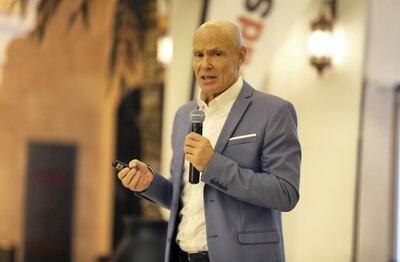A senior Dubai Police officer has told of the tough challenge of changing attitudes to driving in the UAE - after warning young Emiratis "like to speed".
Addressing a road safety conference being held in the emirate, Captain Salem Al Amimi said the force is making a concerted effort to educate UAE citizens about the risks of reckless driving.
Capt Al Amimi said the fact that a large number of younger drivers on the road are Emirati is a contributory factor to the high percentage of accidents involving UAE citizens.
His comments came as a report revealed almost 40 per cent of traffic fatalities in Abu Dhabi over a five-year period were caused by Emirati motorists.
The university study showed male drivers were responsible for almost 80 per cent of all traffic accidents in the UAE capital, and were twice as likely to cause fatal crashes than female motorists.
“Emirati youths like to speed. We are going to schools and universities to educate young people on the importance of safe driving,” said Capt Al Amimi during an event organised by Road Safety UAE and facilities management company Serco Middle East.
“All we can do is offer advice, we can’t get in the passenger seats and sit beside them to make sure they drive safely.
“If you look at the number of Emiratis in the UAE, compared to other countries, there is a bigger percentage than anywhere else involved in these accidents.
“The reason is there are more youths here from the UAE than from any other country. When people arrive in Dubai, from other countries, they have already grown up.”
Traffic police said there were 141 reported fatalities on the emirate's roads in 2018, with a further 191 people suffering serious injuries.
Of those killed, 42 were Pakistani citizens and 40 were Emirati.
There were 61 recorded deaths on Dubai's roads in the first half of this year.
The general attitude towards driving in Dubai had to change, said Capt Al Amimi.
“I was in the car one day and the guy on the radio said you have to ‘drive it like you stole it’ in Dubai,” he said.
“That’s the wrong message to be sending. Dubai is one community and we need to all look out for each other, especially on the roads.”
A study by academics from UAE University in Al Ain paints a similarly stark picture of motoring habits in the Emirates.
The research found Emirati drivers were responsible for almost 40 per cent of all traffic deaths in Abu Dhabi.
The study also found UAE nationals were liable for more than a quarter of all non-fatal road accidents in the emirate.
“UAE nationals were found to be overrepresented both in terms of the total number of crashes and cases of severe or fatal crashes,” the report found.
“In addition, tailgating and reckless driving were the main reasons for crashes in an overwhelming 50 per cent of the incidents.”
University researchers looked at a total of 1.26 million police reports of accidents across the emirate between 2012 and 2017.
It also found Emirati drivers, as well as motorists from Pakistan, India and Egypt, were together responsible for almost two-thirds of reported road traffic accidents.
More than half of passengers and motorists injured in the crashes were not wearing seatbelts, the study also noted.
“The main takeaway is that drivers from certain nationalities appear to be more prone to be involved in more severe crashes,” the report, co-authored by Daniel Albuquerque, assistant professor of transport engineering at UAE University and research assistant Dina Adawalla, said.
“While Emirati drivers accounted for 25 per cent of the total crashes, they accounted for almost 40 per cent of all fatal crashes and 32 per cent of all severe crashes.
“It is worth mentioning that Emiratis account for less than 20 per cent of the total population living in Abu Dhabi.”
Significantly, researchers said their figures also suggested traffic accidents in Abu Dhabi were more likely to result in severe injury or death if they occurred between 10pm and 6am.
Mr Albuquerque claimed the likely reason for the increase was lower road congestion during those times, encouraging motorists to drive faster. Drink driving at night could also be a factor, he suggested.
The UAE University study concluded by suggesting further means of addressing road accidents numbers.
There should be “focused road safety educational campaigns [aimed] specifically toward the Emirati driving community,” it said.
Thomas Edelmann, founder of Road Safety UAE, highlighted the significant efforts Abu Dhabi Traffic Police were making in working to reduce traffic fatalities.
But he emphasised that reckless behaviour such as “lane swerving, tailgating [and] speeding can still be observed on a daily basis”.

“This underlines the unchanged need for even more education and awareness efforts,” he said.
Abu Dhabi Police said it was making significant progress in its efforts to make driving on the emirate's roads safer for all.
In a statement to The National, the force said the number of road deaths in the capital had fell from 8.58 per 100,000 people in 2012 to 4.19 per 100,000 by 2018.
Police said 89 per cent of 'severe road accidents' were caused by male drivers in 2018, though the statement noted there were five times as many male drivers as female drivers on the roads in this period.
"The directorate of traffic patrols in Abu Dhabi Police issues an internal yearly dangerous violations list, which is based on targeting violations with a higher risk and probability of causing serious injury or death. Seatbelt violations are listed among the dangerous violations list."
Police said initiatives such as introducing red light enforcement cameras and speed cameras and altering speed limits in cases of extreme changes in weather were part of a wider safety strategy.



